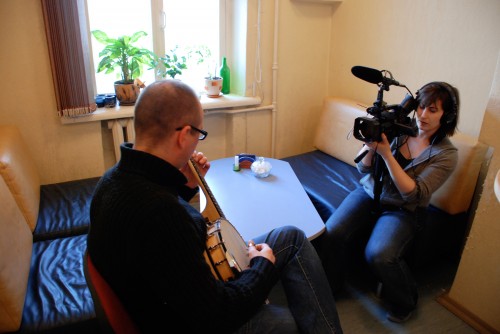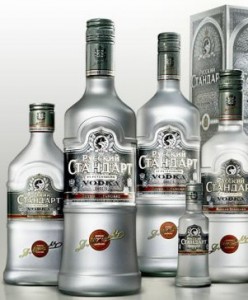Sarah Deming met with filmmaker Robin Hessman at Restaurant Tatiana on the Brighton Beach boardwalk. Over shots of vodka and tasty snacks, we discussed Robin’s feature documentary My Perestroika,which will debut in NY March 25 and March 28 as part of the film series New Directors/New Films, curated by MoMA and the Film Society of Lincoln Center.
 My Perestroika tells the story of five forty-year-old Russians – a married couple teaching history, a single mother, an aging punk rocker, and a successful businessman – tracing their paths from childhoods behind the Iron Curtain to comings-of-age during the collapse of Communism to their disparate fortunes in modern Russia. This beautiful film has the lingering finish of a top-shelf vodka. Highly recommended!
My Perestroika tells the story of five forty-year-old Russians – a married couple teaching history, a single mother, an aging punk rocker, and a successful businessman – tracing their paths from childhoods behind the Iron Curtain to comings-of-age during the collapse of Communism to their disparate fortunes in modern Russia. This beautiful film has the lingering finish of a top-shelf vodka. Highly recommended!
Sarah: How was Sundance?
Robin: Wonderful. The audiences were incredible. We had a screening at 8:30 AM on a Monday, and I thought, “Who’s going to come to this?” But it was packed! We also had a midnight Q&A session that lasted over an hour and continued on the street in front of the theatre. It was exciting to hear people say that they’d had no idea what a Soviet childhood was like, and couldn’t even conceive of the idea that people in the USSR could have happy childhoods, but that they could relate to it. To see people make emotional, personal connections to the characters in the film was very gratifying.
Sarah: I loved the film’s structure. You managed to tell the story of five individual protagonists, which seems really hard to do, while keeping it unified thematically.
Robin: Editing took a long time. The struggle was how to make the film about the natural arc of these characters’ lives rather than trying to make their lives serve the history of the country. If a particular political event didn’t touch them, it’s not in the film, even if it’s important globally. The soundtrack is full of songs that mean a lot to Russians of that generation, and all the archival footage is from their own point of view – lots of home movies, footage from their school.
Sarah: The archival footage is so cool!
Robin: That was one of my favorite parts. I loved sitting in the archives in Russia, waiting for the reels to arrive, and then watching them.
Sarah: Some of your characters are doing well and some are struggling emotionally. There’s no clear sense of whether the change in the country has been good or bad.
Robin: That was very conscious. When I returned from the US after living in Russia for the 1990s, I got the feeling people wanted me to tie everything up in a neat bow for them and tell them what to think about the new, modern Russia. “It went from Communist utopia to porn and mafia land” or “It went from a restrictive, repressive regime to a land of freedom.” But I can’t do that. I see the complexities. I’ve seen friends craving a new pair of leather boots but feeling awful because they grew up thinking that was degenerate. Or friends who are ethnically Russian but grew up in a republic. Emotionally, they support independence for the republic, but that means they will need a $100 visa to visit their grandmother’s grave. And I’ve seen people who used to drop in on each other at all hours and stay up discussing the meaning of life now barely having time to grab a latte.
Sarah: Do you feel like a different person after living in Russia?
Robin: I do. I’d love to know who I’d have become if I’d never gone there. I spent most of my life there between the ages of 18-27, in film school, working for Russian Sesame Street, and then making this film. At this point it’s who I am.
Sarah: You’re not from a Russian family yourself. What attracted you to the culture?
Robin: I had a subscription to Soviet Life when I was ten. My parents didn’t want to let me get it –they were worried I’d be blacklisted or something – but I cried until they gave in. It came in an unmarked, brown paper wrapper like porn. Growing up as a kid during the cold war, I was just so curious about this “evil empire” out there. I didn’t believe that millions of people could all be bad. It started as pure curiosity. Then I got hooked on the history and the literature.
Sarah: How is Russian Sesame Street different than the American version?
Robin: There’s a completely different sensibility. Certain segments that the American producers thought were boring, the Russians production partners called lyrical and sad. There were three special Russian muppets that our team invented. Zeliboba was one of them, a blue monster with feathers and leaves. He wore sneakers, lived in a hollow tree, and had the personality of a six-year-old boy. He was very sensitive. He could smell the melody off a record.
VODKA SHOTS
 Vodka gets its name from the diminutive form of voda, meaning water. This “little water” is one of the oldest distilled beverages in the world, dating back to medieval Poland and Russia. Early vodkas were made through crude heat stills or through leaving the fermented grain or potato mash outside to freeze, concentrating the alcohol. These spirits would have tasted rough and medicinal, unlike the highly refined vodkas we drink today. Although allegedly “colorless, odorless, and tasteless,” vodka always offers hints of where it came from, its subtlety inviting the taster to be more sensitive. Our chilled shots of Russian Standard had gentle notes of anisette, wheat, and snow.
Vodka gets its name from the diminutive form of voda, meaning water. This “little water” is one of the oldest distilled beverages in the world, dating back to medieval Poland and Russia. Early vodkas were made through crude heat stills or through leaving the fermented grain or potato mash outside to freeze, concentrating the alcohol. These spirits would have tasted rough and medicinal, unlike the highly refined vodkas we drink today. Although allegedly “colorless, odorless, and tasteless,” vodka always offers hints of where it came from, its subtlety inviting the taster to be more sensitive. Our chilled shots of Russian Standard had gentle notes of anisette, wheat, and snow.

beautiful interview w/great questions. good for robin for pursuing her love of russia from age 10 onwards. how unusual! so many great russian films, and now hers, of course, which i can’t wait to see. eisenstein is really the only famous one here. archived footage adds so much to a film. just finished watching the great british series jewel in in the crown about the last days of british rule in india in which archives added a great backdrop to the horrid reality of british class subjugation, altho it was nicely pointed out about india’s own caste system.
your interview also gave us a terrific awareness of russian childhood, something we don’t normally think about. i’d love to watch some scenes of the russian sesame street & will google it now. after,of course, a nice shot of…um, o.j.